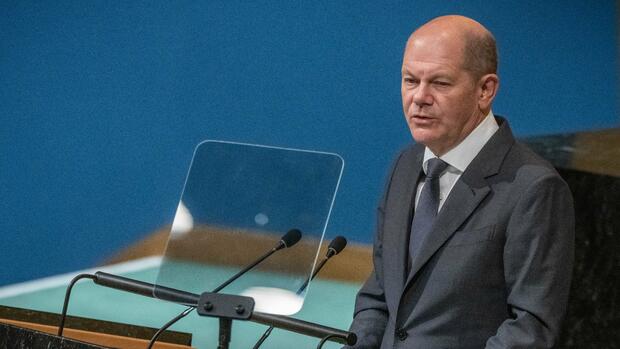A permanent seat for Germany on the UN Security Council is likely to meet with resistance from Russia and China.
(Photo: dpa)
Geneva Chancellor Olaf Scholz (SPD) made his concerns clear in September last year: “Germany is ready to take on greater responsibility,” he said – as a permanent member of the UN Security Council, the most powerful body in the United Nations.
Next week, Scholz will appear again at the general assembly in New York and will probably repeat his wish. The federal government is now formulating its claim to move from a simple UN member to the small group of permanent council members in its national security strategy.
Scholz is also likely to talk about an anniversary: 50 years ago, on September 18, 1973, the Federal Republic of Germany and the then GDR joined the United Nations.
In the five decades that followed, the Federal Republic and later the united Germany did a lot to establish themselves as the ideal member: cooperative, reliable, generous. According to a list by the Foreign Office, Germany is the “second largest contributor to the entire UN system” (2021: 6.7 billion US dollars) and the second largest bilateral donor of humanitarian aid.
The Germans deploy blue helmets and strengthen peacekeeping, they generously grant development funds and are committed to minorities and equal rights. According to the calculation in Berlin, this performance record could secure the right to a permanent seat on the Security Council.
Russia and China are likely to veto a permanent seat for Germany
But experts believe the German effort has little promise of success. “The chances are very bad today,” says the former German State Secretary in the Foreign Office and ex-ambassador to the UN in New York, Gunter Pleuger.
The serious tensions between the West and its leading power, the USA, Russia and China, leave no room for structural reform of the Security Council: The five permanent members and veto powers – the USA, Russia, China, France and Great Britain – enjoy a privileged position there.
The federal government has set out its ambitions for a permanent seat on the UN Security Council in its national security strategy.
(Photo: dpa)
Any one of the five can block plans for council reform. Only if all five agree do initiatives have a chance of getting through. “The US announced a push for Security Council reform last year, but I don’t think the Americans have been able to find a way forward,” said Richard Gowan, UN director of the International Crisis Group. “I fear that Germany will have to wait a long time for its permanent seat. Maybe for eternity.”
It is hardly surprising that Russia and China do not want to fulfill Germany’s wishes. Moscow resents Berlin’s extensive support for Ukraine. Germany is now one of the most important arms suppliers to Ukraine and is helping the country to assert itself against the aggressor Russia.
>> Read here: China is putting pressure on the German economy in Europe
In Beijing, on the other hand, German warnings to respect human rights and the increasing criticism of China in German politics are not well received. Germany’s membership in Europe also speaks against Germany as a member. Having a fourth European state with a permanent seat on the Security Council sounds “almost absurd,” writes political scientist Gunther Hellmann.
Concrete plans for a permanent seat on the council in the 90s
In the 1990s, the Germans had a chance to become a permanent member of the UN body. But this opportunity was not used, remembers diplomat Pleuger.
At that time, former US President George HW Bush gave the impetus for a permanent German seat on the Security Council. After reunification, the Germans negotiated with the USA, France and later Great Britain for a permanent seat.
Japan should also move to the front row of the UN Council. The conversations dragged on for years. Pleuger led the negotiations on the German side. In 1997 there was an agreement in Berlin with the Americans and French on a text “that we wanted to present to Russia and China”.
But then-Chancellor Helmut Kohl suddenly had concerns and lost interest in increasing Germany’s status in the UN. The Chancellor let the US national security advisor know that the Federal Republic is not seeking a permanent seat. “Kohl kind of derailed the train.”
More: What China, Russia, India and the new BRICS members are planning
